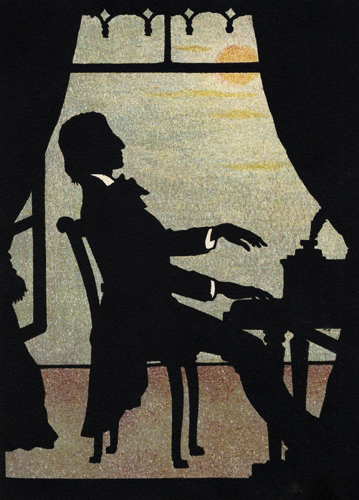Composed c.1834-41; 11 minutes
 Chopin composed his two piano concertos by the time he was 20, the first completed in the year that he graduated from the Warsaw Conservatoire. They were designed primarily as a vehicle for his own virtuosity and expressive playing, not as a contest between piano and orchestra. He would play them with or without orchestra, or with a small group of strings. “By the way, you did not let us know whether you have finished your third concerto,” his father wrote in 1834, four years after Chopin had completed his second. Chopin had already made a start on No. 3, but only returned to the piece seven years later in 1841, giving it the title Allegro de concert (Concert Allegro). Now it was a solo piece, but clearly in the manner of the opening movement of a concerto. Chopin makes little attempt to disguise where the ‘orchestral’ introduction ends, where the ‘solo’ prepares to enter with a characteristic flourish and where the main theme begins, now in a more pianistic, spontaneous sounding manner. The absence of orchestra is of little consequence since this, after all, is how Chopin sometimes played his two earlier concertos. The structure has been described as that of a compressed concerto movement played as a solo. It nevertheless speaks with the distinctive voice of Chopin from his Warsaw and Vienna days, interspersed with the more mature Chopin, now in Paris—altogether a fascinating combination of styles, unique to his catalog, technically challenging, well put together and frequently inspired.
Chopin composed his two piano concertos by the time he was 20, the first completed in the year that he graduated from the Warsaw Conservatoire. They were designed primarily as a vehicle for his own virtuosity and expressive playing, not as a contest between piano and orchestra. He would play them with or without orchestra, or with a small group of strings. “By the way, you did not let us know whether you have finished your third concerto,” his father wrote in 1834, four years after Chopin had completed his second. Chopin had already made a start on No. 3, but only returned to the piece seven years later in 1841, giving it the title Allegro de concert (Concert Allegro). Now it was a solo piece, but clearly in the manner of the opening movement of a concerto. Chopin makes little attempt to disguise where the ‘orchestral’ introduction ends, where the ‘solo’ prepares to enter with a characteristic flourish and where the main theme begins, now in a more pianistic, spontaneous sounding manner. The absence of orchestra is of little consequence since this, after all, is how Chopin sometimes played his two earlier concertos. The structure has been described as that of a compressed concerto movement played as a solo. It nevertheless speaks with the distinctive voice of Chopin from his Warsaw and Vienna days, interspersed with the more mature Chopin, now in Paris—altogether a fascinating combination of styles, unique to his catalog, technically challenging, well put together and frequently inspired.